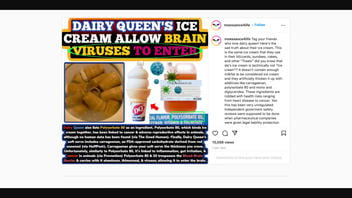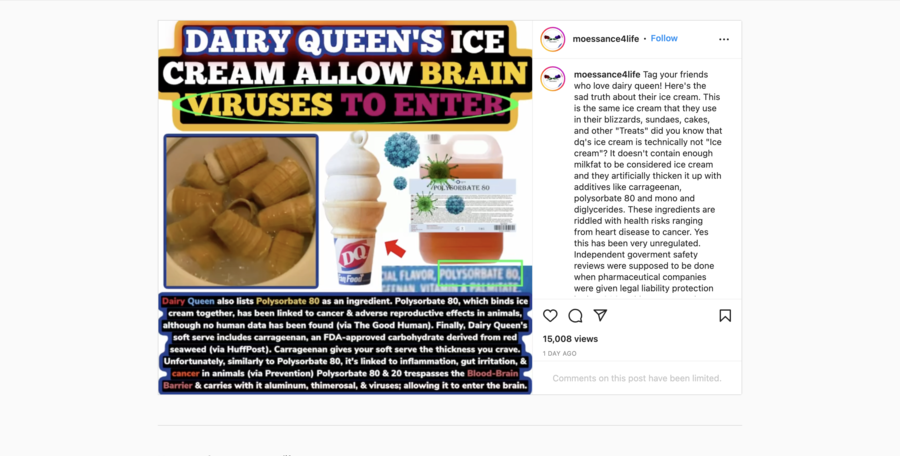
Are the food additives found in Dairy Queen's soft serve harmful to the human body? No, that's not true: The amount of food additives in a Dairy Queen soft serve is not enough to cause the health problems in this claim. A chemist told Lead Stories that there are very few health risks for these food additives.
The claim appeared in an Instagram post on July 27, 2022. Text in the post reads, "DAIRY QUEEN'S ICE CREAM ALLOW BRAIN VIRUSES TO ENTER." The caption to the post opens:
Tag your friends who love dairy queen!
(Instagram screenshot taken on Thu Jul 28 11:25:12 2022 UTC)
The FAQ section on Dairy Queen's website answers the question, "Is your soft serve really ice milk? Is it 95% fat-free?" Dairy Queen says that technically, their soft serve can not be qualified as ice cream. Instead, it's categorized as "reduced-fat" ice cream because the soft serve contains five percent butterfat content, while regular ice cream contains 10 percent at a minimum.
The Instagram post tells readers to be wary of calcium carbonate, carrageenan, lecithin, mono and diglycerides, polysorbate 60, polysorbate 80 and xanthan gum.
The only ingredients that appear in both the Instagram post and Dairy Queen's ingredient list for a vanilla cone are carrageenan, mono and diglycerides, and polysorbate 80. The post claims that these four ingredients cause heart disease and cancer, and polysorbate 80 allows viruses to enter the brain.
According to the University of California's Agricultural and Natural Resources, carrageenan is on the Food and Drug Administration's (FDA) list of Generally Recognized As Safe food additives. The World Health Organization Food and Agricultural Organization of the United Nations Expert Committee on Food Additives reviewed scientific studies on carrageenan in 2014 and found that its use in infant formula is "not of concern" at up to 1,000 milligrams per liter.
Polysorbate 80 is used as an emulsifier in the soft serve, or ice milk. According to the FDA, if polysorbate 80 is used as an emulsifier in ice cream, frozen custard, ice milk, fruit sherbet and nonstandardized frozen desserts, it should not exceed 0.1 percent of the finished frozen dessert.
Glycerides are a glycerol molecule with one or more fatty acids. A monoglyceride is a glycerol molecule with one fatty acid chain, while a diglyceride has two fatty acid chains. The two found in the ingredient list of Dairy Queen's soft serve are used to help blend oil and water, specifically used here to give their soft serve a creamier consistency. According to the FDA, both are on the General Recognized As Safe list.
Hans Plugge, the principal of Safer Chemical Analytics, LLC, discussed the risks of the additives in a July 29, 2022, email.
There are very few health effects described for these four additives, and definitely not cancer, he said. He has also never heard of polysorbate sequestering metal ions, except for use in drug delivery. He linked to this scientific article to prove his point.
Plugge ended the email with this paragraph:
... the whole things comes down to hazard vs risk. Eating a gallon of polysorbate would probable be not friendly to your gut, eating a (very) small amount poses no discernable risk. Some things (including 'natural' chemicals) have hazard in their pure form, the exposure can be extremely limited hence no discernable risk. Example acetic acid in its pure form vs vinegar.
Here are other Lead Stories fact checks debunking claims about cancer.


















